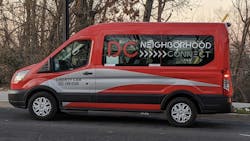Via to partner with Washington, D.C., to provide healthcare workers new on-demand option
Via and the Washington, D.C., Department of For-Hire Vehicles (DFHV) have launched an on-demand service for essential healthcare workers at Howard University Hospital and United Medical Center during the COVID-19 pandemic.
DFHV, Via and operator Transco have partnered to transform and repurpose D.C. Neighborhood Connect, formerly D.C. Microtransit, to provide exclusive rides to those workers to and from their work and homes after 9:00 p.m.
Typically, D.C. Neighborhood Connect services Wards 4,5 and 8, but to ensure widespread transportation access for these essential workers, the service zone has been expanded to cover all the District, as well as Prince George’s County and part of Montgomery County, Md.
Health care workers pay a $3 flat-rate fare for rides between 9:00 p.m. and 1:00, a.m., traditionally a timeframe with limited public transit options that have been reduced further during the coronavirus pandemic.
“Faced with the current crisis, cities and public transit authorities are actively seeking flexible mobility solutions to help critical employees get to work safely,” said Via CEO and co-founder Daniel Ramot. “Our partnership with DFHV to repurpose the D.C. Neighborhood Connect service demonstrates how technology-enabled solutions can swiftly step in to utilize existing infrastructure to provide safe, reliable and efficient mobility services for essential workers, while complementing existing public transit systems.”
Health care workers enter a ride code provided by their hospital using the D.C. Neighborhood Connect app (iOS and Android) from their smartphone. They can hail one of 11 high-capacity vehicles. Via’s algorithms enable multiple riders to share a vehicle, with a maximum of three health care workers per vehicle to allow for proper social distancing. Via’s technology directs passengers to a nearby corner for pickup, allowing for quick and efficient shared trips without lengthy detours, fixed routes or schedules.
Mayor Bowser’s stay home order provides that drivers of ride-sharing vehicles engaged in essential travel must have certain disinfecting protocols and may not have more than two other persons in their vehicle at any time. Mayor’s Order 2020-063 further clarifies that: (1) face masks are required for individuals using taxis, ride shares, private transportation providers; and (2) ride-sharing companies and other private transportation providers must require employees and independent contractors to wear gloves and cloth or surgical masks and instruct them on safe use.
Via is partnering with dozens of municipalities, public transit agencies, healthcare organizations and nonprofits around the world in places like Berlin, Abu Dhabi, the UK, Malta, New Zealand and Columbus, Ohio, to help utilize existing transit infrastructure during this time of emergency. Via’s services include consulting to help quickly optimize transit networks to address immediate needs, and technology and operational expertise to help get essential workers where they need to go and to bring goods, pharmaceuticals and services to people – where they are.

